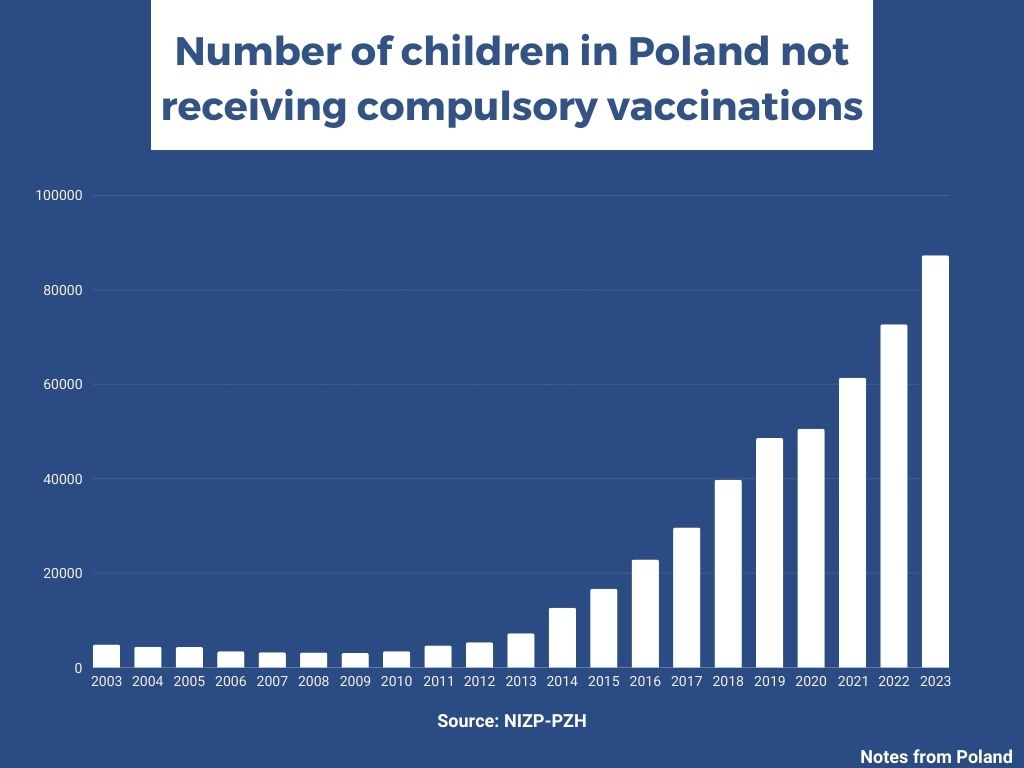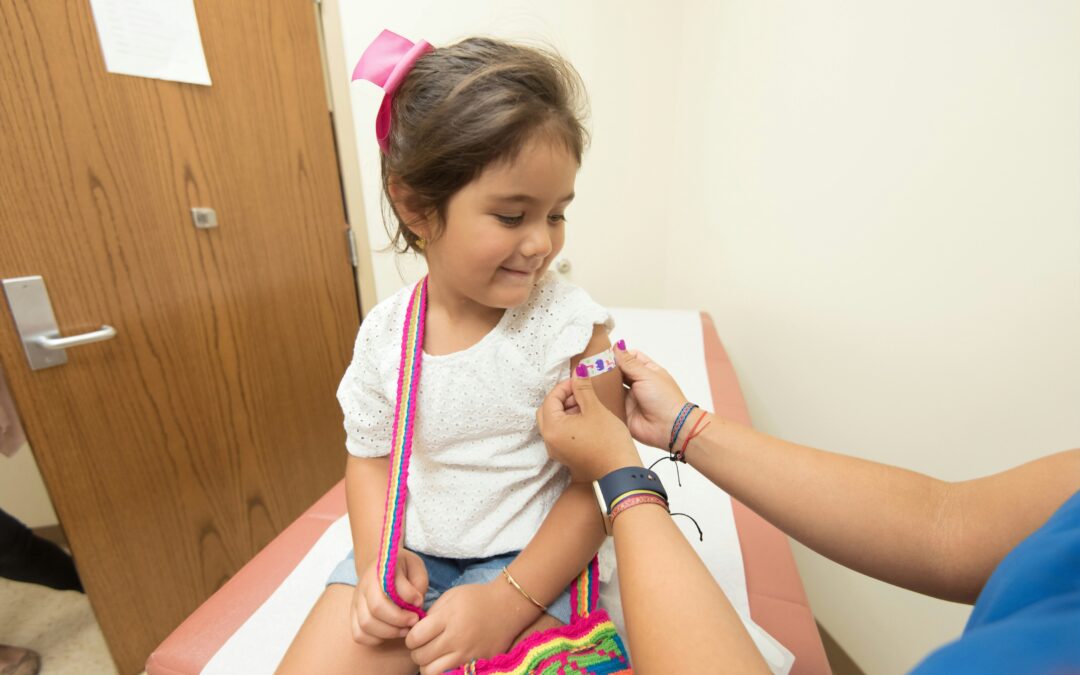Poland has seen a surge in measles cases, with the number of infections in recent months around 17 times higher than last year. The figures come after a record number of parents refused compulsory vaccinations for their children last year.
That led UNICEF to warn last week – as it has in the past – that Poland has lost herd immunity for measles due to its falling vaccination rate. However, the health minister has denied this, claiming that there are just certain regions with lower vaccination rates rather than a nationwide issue.

The latest figures from the European Centre for Disease Prevention and Control (ECDC), an EU agency, show that, in March, April and May this year, Poland recorded 171 cases of measles. In the same three months last year, the figure was just ten. Across the whole of last year, only 37 cases were recorded in Poland.
Other countries have also seen a rise in infections in recent months, with Austria (220), Belgium (235), France (232), Italy (429) and Romania (534) seeing more cases than Poland in March, April and May this year.
Last week, new official data from Poland’s National Institutes of Public Health and Hygiene (NIPH–NIH) showed that in 2023 the number of children whose parents refused compulsory vaccinations, including against measles, rose once again.
There were 87,344 such refusals last year, up from 72,722 in 2022 and over 25 times higher than the figure of 3,437 recorded in 2010. That rise is ascribed in particular to the spread of false claims that vaccines are harmful.
Sorry to interrupt your reading. The article continues below.

Notes from Poland is run by a small editorial team and published by an independent, non-profit foundation that is funded through donations from our readers. We cannot do what we do without your support.
Last week, UNICEF warned that Poland has lost so-called herd immunity against measles. That refers to the minimum proportion of the population that must be vaccinated to ensure that those who cannot be vaccinated are protected from a disease.
“In Poland, we cannot talk about population immunity [anymore],” said Jan Bratkowski of UNICEF Polska. “This means that children who, for various reasons, cannot be vaccinated against measles are much more likely to contract the disease.”
UNICEF cited data from 2022 indicating that only 91% of children in Poland received the first dose of measles vaccine and just 77% received the second. The level seen as necessary for herd immunity is 95%.
“We should not see any cases of measles, because the vaccine is very effective and if vaccination levels exceeded 95%, there would be no cases,” Ewelina Gowin, an infectious diseases specialist at Wielkopolska Pediatrics Centre, told broadcaster TVN.
The number of children receiving measles vaccines in Poland has fallen below the level required for herd immunity, warns @UNICEF.
It blames "disinformation and myths" spread by anti-vaccination groups, and has appealed to the government to take action https://t.co/GKLTnDoV5Y
— Notes from Poland 🇵🇱 (@notesfrompoland) April 22, 2021
However, in response to those claims by UNICEF, NIPH–NIH issued a statement saying that “it CANNOT be said that we have lost herd immunity”.
Instead, it argued that, because of big differences in local vaccination rates – which range between 86% and 97% in Poland’s 16 provinces – “there are outbreaks of disease scattered throughout the country”.
Likewise, health minister Izabela Leszczyna today told TVN that “it cannot be said that Poland has lost this population immunity” and that instead there are “outbreaks in certain provinces”.
She noted that, of 220 measles cases recorded in Poland so far this year, almost half, 100, are in the Mazovia province and a further 70 in Lower Silesia.
UNICEF alarmuje, że polska populacja straciła zbiorową odporność na odrę. Powód to niska wyszczepialność. Wynosi ona sporo poniżej progu bezpieczeństwa – 95 procent. O tym w #JedenNaJeden mówiła ministra zdrowia Izabela Leszczyna.https://t.co/rYzK0SARJB
— tvn24 (@tvn24) July 22, 2024
Leszczyna said that the government was making efforts to increase the vaccination rate. But this should take the form of “convincing [parents] rather than fining” them, she argued.
“In May, together with the education ministry and family, labour and social policy ministry, we sent information about vaccinations to all parents, to nurseries, kindergartens and schools,” said Leszczyna.
“At the same time, I sent a request to all managers of medical entities to take an interest in vaccinations, to carry out additional vaccinations, to carry out information campaigns,” added the minister. “We will inform, we are preparing promotional campaigns.”
Only children with legally required vaccinations would be admitted to public preschools and nurseries under a proposal put forward in the Senate and backed by a deputy health minister.
Since 2010, the number of parents refusing vaccines has risen 14-fold https://t.co/Qhd2f5ICCB
— Notes from Poland 🇵🇱 (@notesfrompoland) January 14, 2021
Yesterday, the new head of Poland’s Chief Sanitary Inspectorate (GIS), Paweł Grzesiowski, told TVN that he also favours educating rather than punishing parents who are reluctant to vaccinate. He noted that punishments can actually strengthen anti-vaccine attitudes.
However, Grzesiowski also called for a change in the way that punishments for parents who refuse compulsory vaccinations are applied.
Instead of the current system, which can result in large fines amounting to thousands of zloty but which can take a long time to apply, he said it would be better to provide quicker but smaller fines of hundreds of zloty.
UNICEF alarmuje, że polska populacja straciła zbiorową odporność na odrę. Powód to niska wyszczepialność. Więcej na ten temat mówił w TVN24 doktor Paweł Grzesiowski, Główny Inspektor Sanitarny.
ZOBACZ ⤵️https://t.co/S7b48ETbOt
— tvn24 (@tvn24) July 21, 2024
Main image credit: CDC/Unsplash

Daniel Tilles is editor-in-chief of Notes from Poland. He has written on Polish affairs for a wide range of publications, including Foreign Policy, POLITICO Europe, EUobserver and Dziennik Gazeta Prawna.



















